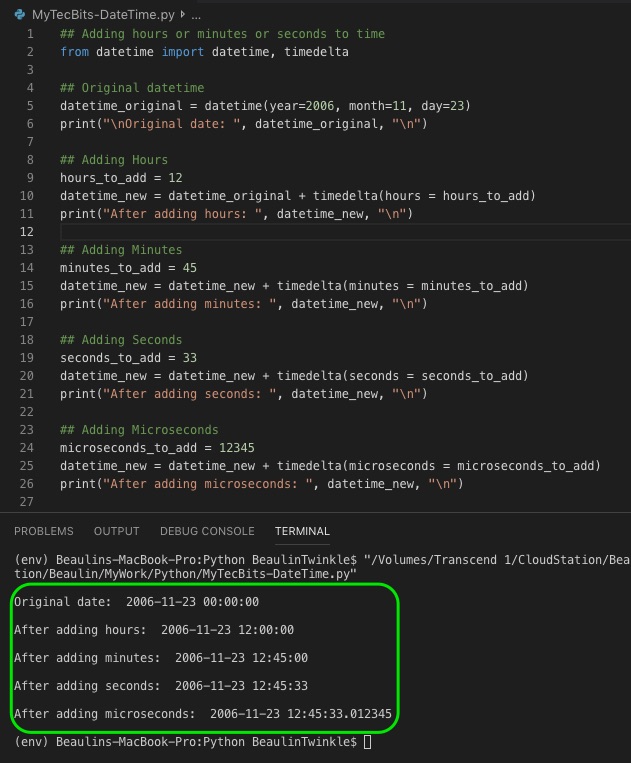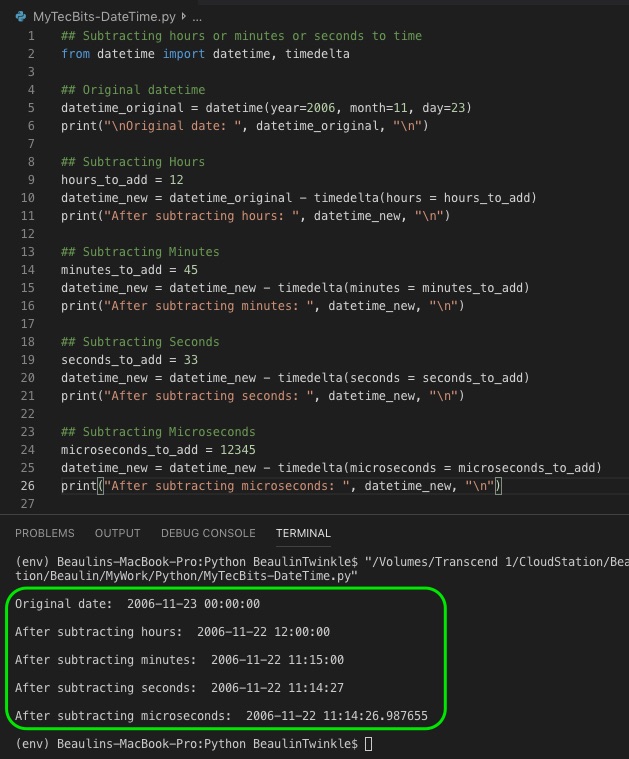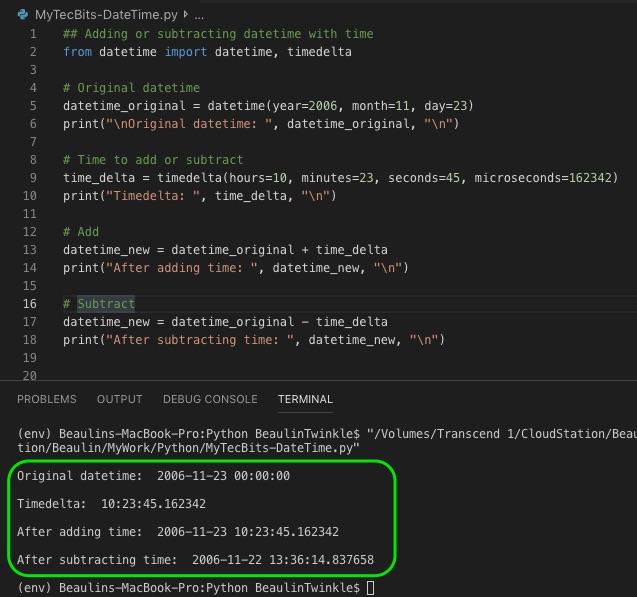Earlier we have seen adding and subtracting days to and from date object. Now we will see how to perform addition and subtraction of datetime with time object.
Adding hours or minutes or seconds
To start with, let us see how to add hours or minutes or seconds or microseconds individually to a datetime object. To do time additions, use the timedelta object’s arguments to add the individual time components and add the timedelta object with the date object. here is an example.
1 2 3 4 5 6 7 8 9 10 11 12 13 14 15 16 17 18 19 20 21 22 23 24 25 26 | ## Adding hours or minutes or seconds to datetimefrom datetime import datetime, timedelta## Original datetimedatetime_original = datetime(year=2006, month=11, day=23)print("\nOriginal date: ", datetime_original, "\n")## Adding Hourshours_to_add = 12datetime_new = datetime_original + timedelta(hours = hours_to_add)print("After adding hours: ", datetime_new, "\n")## Adding Minutesminutes_to_add = 45datetime_new = datetime_new + timedelta(minutes = minutes_to_add)print("After adding minutes: ", datetime_new, "\n")## Adding Secondsseconds_to_add = 33datetime_new = datetime_new + timedelta(seconds = seconds_to_add)print("After adding seconds: ", datetime_new, "\n")## Adding Microsecondsmicroseconds_to_add = 12345datetime_new = datetime_new + timedelta(microseconds = microseconds_to_add)print("After adding microseconds: ", datetime_new, "\n") |

Subtracting hours or minutes or seconds
To perform subtraction of individual time components from datetme object, just create a timedelta object with the time component and then subtract from the datetime object. Here is an example.
1 2 3 4 5 6 7 8 9 10 11 12 13 14 15 16 17 18 19 20 21 22 23 24 25 26 | ## Subtracting hours or minutes or seconds to datetimefrom datetime import datetime, timedelta## Original datetimedatetime_original = datetime(year=2006, month=11, day=23)print("\nOriginal date: ", datetime_original, "\n")## Subtracting Hourshours_to_add = 12datetime_new = datetime_original - timedelta(hours = hours_to_add)print("After subtracting hours: ", datetime_new, "\n")## Subtracting Minutesminutes_to_add = 45datetime_new = datetime_new - timedelta(minutes = minutes_to_add)print("After subtracting minutes: ", datetime_new, "\n")## Subtracting Secondsseconds_to_add = 33datetime_new = datetime_new - timedelta(seconds = seconds_to_add)print("After subtracting seconds: ", datetime_new, "\n")## Subtracting Microsecondsmicroseconds_to_add = 12345datetime_new = datetime_new - timedelta(microseconds = microseconds_to_add)print("After subtracting microseconds: ", datetime_new, "\n") |

Adding and subtracting datetime object with time object
So far, we have seen how to add and subtract individual time component like hours or minutes or seconds from a datetime object. Now we will see hot to add or subtract a time object with all the time components with a datetime object. To do this, you need to create a timedelta object with all the time components using the arguments. Here is an example to add or subtract a time of “10:23:45.162342” hours from a datetime using timedelta object.
1 2 3 4 5 6 7 8 9 10 11 12 13 14 15 16 17 18 | ## Adding or subtracting datetime with timefrom datetime import datetime, timedelta# Original datetimedatetime_original = datetime(year=2006, month=11, day=23)print("\nOriginal datetime: ", datetime_original, "\n")# Time to add or subtracttime_delta = timedelta(hours=10, minutes=23, seconds=45, microseconds=162342)print("Timedelta: ", time_delta, "\n")# Adddatetime_new = datetime_original + time_deltaprint("After adding time: ", datetime_new, "\n")# Subtractdatetime_new = datetime_original - time_deltaprint("After subtracting time: ", datetime_new, "\n") |

Reference
- About timedelta object at Python docs.

Is there an easy button? I just want “end_time = start_time +1 minute” or something . Why does it take 15 lines of code and there are no good ways of testing except write in a script and then exist the script run the script the script fails so you have to edit the script again. Why aren’t codes easy? Why would anyone want to be a coder if you have to write 20 lines to do one thing?
Hi Bob,
This example is to add hours minutes and seconds separately to a daytime variable. However, if you need to add hours or minutes in a single line, then you can use timedelta with multiple arguments like timedelta(days=10, seconds=10, microseconds=10, milliseconds=10, minutes=10, hours=10, weeks=10) and add it to your start_time. Here is an example:
from datetime import datetime, timedelta
start_time = datetime(year=2006, month=11, day=23, hour=10, minute=10)
end_time = start_time + timedelta(hours = 3, minutes=15, seconds=30)
print(“After adding time: “, end_time, “\n”)